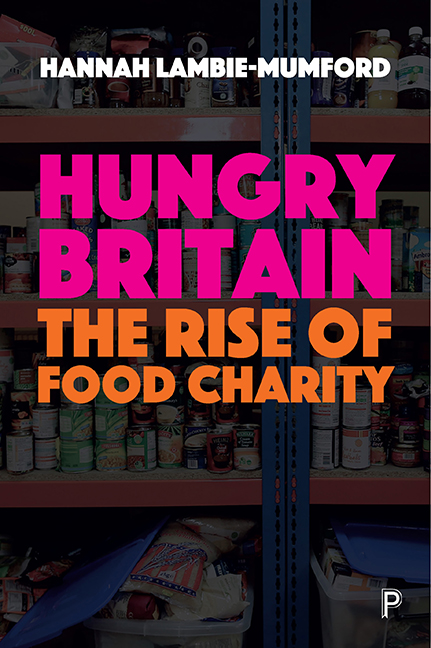Book contents
- Frontmatter
- Dedication
- Contents
- List of figures
- List of abbreviations
- Acknowledgements
- Foreword
- One Introduction
- Two Hunger and charitable emergency food provision in the UK and beyond
- Three Theories of the food insecurity ‘problem’ and the right to food ‘solution’
- Four Food charity: the ‘other’ food system
- Five The sustainability of food charity
- Six Food charity as caring
- Seven Food charity and the changing welfare state
- Eight Conclusion
- References
- Index
Six - Food charity as caring
Published online by Cambridge University Press: 05 April 2022
- Frontmatter
- Dedication
- Contents
- List of figures
- List of abbreviations
- Acknowledgements
- Foreword
- One Introduction
- Two Hunger and charitable emergency food provision in the UK and beyond
- Three Theories of the food insecurity ‘problem’ and the right to food ‘solution’
- Four Food charity: the ‘other’ food system
- Five The sustainability of food charity
- Six Food charity as caring
- Seven Food charity and the changing welfare state
- Eight Conclusion
- References
- Index
Summary
As the first of two empirical chapters on respecting, protecting and fulfilling the human right to food, this chapter explores the role of emergency food charity in practice in its current form. Having examined the nature of and ways of working within the case study organisations (Chapters Four and Five), and given the absence of evaluative data, we need to know more about the aims and perceived achievements of emergency food providers from their own perspectives to better understand how their current practices (and potential future practices) fit within the context of protecting, respecting and fulfilling the right to food.
To better understand this emergency food provision in relation to the problem of food insecurity, the notion of ‘need’ is explored in the first instance; that is, what is need for this provision, and how does it relate to the experience of food insecurity? This chapter also explores the notion of success in emergency food provision, to come to a better understanding of how this provision might fit within the context of right to food solutions. It asks: what difference do these projects think they are making (in terms of success), and how does this relate to the right to food framework presented in this book?
This chapter also explores a more normative question about the role of charity in responding to the problem of food insecurity and realising the human right to food. It draws on the notion of responsibility to explore these issues. The ways in which these providers are, in practice, assuming responsibility for protecting against hunger is discussed, but a further question is raised: what role should these charities be playing? These questions set the scene for detailed discussion of the role of charity versus the state in Chapter Seven.
Care ethics is employed as a theoretical lens to guide the analysis. There is a rich literature exploring care and ethics; this framework is drawn on here in a particular way, adopting the term ‘care ethics’ to refer to ‘a critical ethic of care and responsibility’ (Lawson, 2007, p.2). Seeing care ‘as a form of ethics’ (Popke, 2006, p.506), the concept is drawn on to frame an understanding of care as social.
- Type
- Chapter
- Information
- Hungry BritainThe Rise of Food Charity, pp. 95 - 112Publisher: Bristol University PressPrint publication year: 2017



